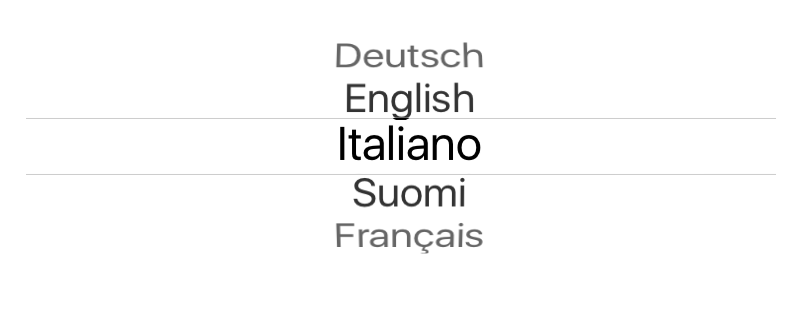PickerView

super: UIPickerView (on iOS)
The PickerView class implements objects, called picker views, that use a spinning-wheel or slot-machine metaphor to show one or more sets of values. Users select values by rotating the wheels so that the desired row of values aligns with a selection indicator. The user interface provided by a picker view consists of components and rows. A component is a wheel, which has a series of items (rows) at indexed locations on the wheel. Each component also has an indexed location (left to right) in a picker view. Each row on a component has content, which is either a string or a view object such as a label (Label) or an image (ImageView)).
Events
-
Load() This event is called when the object becames available in the current runtime system.
-
WillShow() The view is about to be added to the App's views hierarchy.
-
WillHide() The view is about to be removed from the App's views hierarchy.
-
DidSelectCell(column: Int, row: Int) This event is called by the picker view when the user selects a row in a column.
-
RowHeight(column: Int): Float This event is called by the picker view when it needs the row height to use for drawing row content in the specified column.
-
ColumnWidth(column: Int): Float This event is called by the picker view when it needs the column width.
-
DidShow() The view has been added to the App's views hierarchy.
-
DidHide() The view has been removed from the App's views hierarchy.
-
Unload() This event is called when the object has been removed from the current runtime system (but not yet deallocated).
Properties
-
var pickerSize: PickerViewSize Description not yet ready.
-
var showsSelectionIndicator: Bool Description not yet ready.
-
var numberOfComponents: Int Description not yet ready. (read-only)
-
var dataSet: Object The DataSet object provides information that PickerView needs to construct its content.
-
var objectName: String The name of the object.
Methods
-
func reload(reloadDataSet: Bool) Reloads all components of the picker view.
-
func reloadComponent(identifier: Int) Reloads a particular component of the picker view. Calling this method causes the picker view to query the delegate for new data for the given component.
-
func numberOfRowsInComponent(identifier: Int): Int Returns the number of rows for a component. A picker view fetches the value of this property from the data source and and caches it. The default value is zero.
-
func selectRowInComponent(row: Int, identifier: Int, animated: Bool) Selects a row in a specified component of the picker view.
-
func selectedRowInComponent(identifier: Int): Int Returns the index of the selected row in a given component. A zero-indexed number identifying the selected row, or -1 if no row is selected.
-
func animate(duration: Float, delay: Float, options: AnimationOption, animations: Closure, completion: Closure) Animate changes to one or more views using the specified duration, delay, options and completion handler.
-
func setFocus() Force focus to be set to the selected control. For TextField and TextView that means force Keyboard to appear.
-
func clearFocus() Clear focus from selected control
Enums
PickerViewSize
- .Default
- .Mini
- .Small
AnimationOption
- .AllowAnimatedContent
- .AllowUserInteraction
- .Autoreverse
- .BeginFromCurrentState
- .CurveEaseIn
- .CurveEaseInOut
- .CurveEaseOut
- .CurveLinear
- .LayoutSubviews
- .OverrideInheritedCurve
- .OverrideInheritedDuration
- .OverrideInheritedOptions
- .Repeat
- .ShowHideTransitionViews
- .TransitionCrossDissolve
- .TransitionCurlDown
- .TransitionCurlUp
- .TransitionFlipFromBottom
- .TransitionFlipFromLeft
- .TransitionFlipFromRight
- .TransitionFlipFromTop
- .TransitionNone